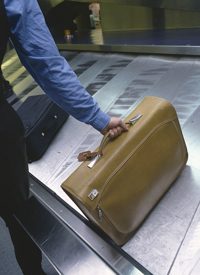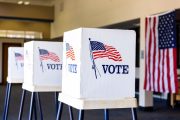
On January 10, 44-year-old Coumar Persad and 31-year-old Davon Webb, eight-year veterans of the TSA force at New York’s John F. Kennedy International Airport, were sentenced to six months in jail and five years’ probation after pleading guilty to having stolen $40,000 from a passenger’s suitcase in January 2011. At the time of the men’s arrest, authorities told CBS New York that the suspects had apparently helped themselves to passengers’ possessions before, Persad having allegedly admitted to prior instances.
Indeed, it does appear that they had a system worked out in advance of the 2011 incident. Persad spotted the cash while X-raying the bag, which was destined for Buenos Aires. He told Webb to mark the bag with tape so they could easily find it later — which they did, removing as much cash as they could fit into their pockets. (There was $170,000 in all, belonging to a woman authorities have been unable to contact in Argentina; they believe she may have been a drug courier who was killed because of the missing money.) Investigators said they were able to recover all but $20 of the stolen money from the two men’s homes.
The extremely light sentence meted out to Persad and Webb has raised some eyebrows. A $40,000 theft, George Washington University law professor Jonathan Turley points out, “would constitute grand larceny, but they were given a sentence that falls on the border with a misdemeanor.”
“In New York,” Turley explains, “grand larceny applies for crimes with any theft over $1,000. This would be 40 times that amount.” He goes on to list the Empire State’s maximum sentences for such a crime, ranging from four years for grand larceny in the fourth degree to 25 years for grand larceny in the first degree. Yet Persad and Webb got a mere six months behind bars.
Meanwhile, just last August three men were sentenced to prison terms ranging from 15 to 19 years for robbing a First National Bank in Houston, Texas, and making off with over $40,000 — about the same amount Persad and Webb purloined. Even the unarmed getaway car driver, who did not enter the bank, got over 11 years. True, these sentences were harsher than they might otherwise have been because the three robbers were particularly cruel and abusive, and two later took hostages in a nearby apartment building; but still, the difference between their sentences and those given to Persad and Webb is enormous.
Turley recounts other cases where similar crimes by persons not employed by the government have resulted in much harsher sentences: “For example, a rapper who stole a purse with $6000 was given a seven year sentence. I would put two TSA officers stealing $40,000 as a bit more serious than a ramped up purse snatching. Even [a] singing rabbi got one to three years for stealing $36,000 from a woman.”
“I fail to understand why, even with a plea, these men were given such a light sentence,” Turley writes. But really, it’s no mystery. The simple fact of the matter is that being employed by the government tends to insulate one from the legal consequences of his behavior. Police officers who mistreat the people they are supposed to be protecting and serving often end up merely being put on “administrative leave” while their departments conduct investigations that — more often than not — find that the officers did nothing wrong. Military employees and contractors who brutalize detainees are given cover by Presidents, who, in turn, are not prosecuted by their successors. Even just being well connected in Washington is enough to escape prosecution, as witness Congress’ retroactive grant of immunity to telecommunications companies who cooperated with the Bush administration’s warrantless wiretapping of Americans’ phone calls. In fact, about the only surefire way for a government employee to be hounded by the law as a civilian would is to rat on the government. Uncle Sam doesn’t like stool pigeons any better than the Mob does; just ask Pfc. Bradley Manning.
One more lesson to be drawn from this incident: If you must fly, don’t put anything valuable in your checked luggage. You may never see it again.



